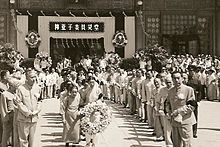Liu Yazi

Liu Yazi (
Liu Wu-chi, a literary scholar.[1]
Career

Liu was a leader of the
vernacular language.[2]
Liu went to Canton in 1923 to join the Guomindang Party (GMD) in 1923, but soon became resentful of the leadership of Chiang Kai-shek and in 1927 fled to Japan to escape repression. In 1932, however, he was re-elected to the GMD Central Supervisory Committee and was appointed to a position in the Shanghai City Government.[1]
In the 1930s, Liu continued to be a prolific writer and poet, still preferring the classical forms.[3] After the outbreak of the
strict classical forms. When Mao arrived in Chongqing to begin direct negotiations with Chiang Kai-shek, he presented Liu with one of his most well-known poems, "Snow," for Liu to publish. Mao later wrote poems, "For Mr. Liu Yazi," dated 1949 and October 1950.[4]
After the war Shanghai did not seem safe, so Liu fled once again to Hong Kong, where he continued his anti-GMD activities. In 1949 he moved to Beijing. He was a member of the Standing Committee of the National People's Congress from 1954 to 1958, but died of pneumonia in 1958.[1] He was buried the in Babaoshan Revolutionary Cemetery.
See also
Notes
- ^ a b c d "Liu Ya-tzu," in Howard Boorman, ed., Biographical Dictionary of Republican China Vol II (New York, 1968), pp. 421- 423 (quote at p. 421).
- ^ Michel Hockx, Question of Style: Literary Societies and Literary Journals in Modern China (Leiden, Brill, 2003)pp. 35-46.
- ^ Susan Daruvala,"Yuefeng: A Literati Journal of the 1930s," in Kirk Denton, Michel Hockx. ed., Literary Societies of Republican China (Lanham, MD, Lexington Books, 2008), p. 355.
- ^ The Poems of Mao Zedong (Berkeley, University of California Press, 2008), pp. 21, 77, 79.
